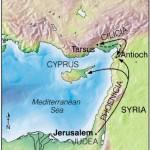Second Generation Disciples and the Gentiles in Acts 11

As you probably know (if you’ve read my blog over the last few weeks) our church is studying the Book of Acts together. Last Sunday, we discussed Acts 11, where Peter reports about his encounter with the gentile Cornelius and his family and friends… and the Holy Spirit.
Perhaps the most important verse in that chapter is this one: “When they heard these things they fell silent. And they glorified God, saying, “Then to the Gentiles also God has granted repentance that leads to life.” (Acts 11:18 ESV)
The “they” in that passage refers (at least) to “the circumcision party”, a faction of disciples of Jesus who were upset that Peter had associated with (even ate with) Gentiles. (See Acts 11:2-4.)
The “these things” in that passage is Peter’s report concerning God choosing the Gentiles for salvation and demonstrating that through the work of the Holy Spirit. (See Acts 11:15-17.)
However, there is another very interesting passage immediately following that one. In fact, I almost read over it without noticing it. Here it is:
Now those who were scattered because of the persecution that arose over Stephen traveled as far as Phoenicia and Cyprus and Antioch, speaking the word to no one except Jews. But there were some of them, men of Cyprus and Cyrene, who on coming to Antioch spoke to the Hellenists(1 )also, preaching the Lord Jesus. (Acts 11:19-20 ESV)
“Those who were scattered” seems to point back to disciples of Jesus who had originally been from Jerusalem. For example, Luke had earlier said this about this same group of believers:
And there arose on that day a great persecution against the church in Jerusalem, and they were all scattered throughout the regions of Judea and Samaria, except the apostles. Devout men buried Stephen and made great lamentation over him. But Saul was ravaging the church, and entering house after house, he dragged off men and women and committed them to prison. Now those who were scattered went about preaching the word. (Acts 8:1b-4 ESV)
Now, we don’t know if “those who were scattered” represent first generation disciples (i.e., those who had physically been with Jesus, including the 120 mentioned in Acts 1:15) or if they followed Jesus because of the witness of other disciples (i.e., such as those who were “added” later as reported in Acts 2:41, Acts 2:47, and Acts 5:14).
However, as Luke tells us in Acts 8:1-4 (above), “those who were scattered” (who were not among The Twelve) proclaimed the good news of Jesus Christ with Jews that they met in Judea and Samaria (following Jesus’ prediction/command in Acts 1:8).
Then, at some point, “those who were scattered” continued moving north out of the Judea/Samaria regions. By the time we get to Acts 11:19, “those who were scattered” (from Jerusalem) had reached Phoenicia, Cyprus, and Antioch.
Whether or not “those who were scattered” knew what God had done that day in the house of Cornelius, we are not told explicitly. But, we are told that while “those who were scattered” were traveling farther from Jerusalem and into more Gentile territory, they continued to proclaim the gospel to Jews only.
Then, another generation of disciples came on the scene. These are disciples who heard the message of the gospel proclaimed by “those who were scattered.” They are described as people from Cyprus and Cyrene. When they came to Antioch, they did something still considered outrageous by “those who were scattered” (at least, they would have considered it outrageous if we consider their action).
These second generation (at least) disciples began proclaiming the good news of Jesus Christ to Gentiles – that is, to people from nations other than Israel… to people who were not ethnic Jews.
Once again, we see God using The Twelve to introduce a work (i.e., salvation offered to the Gentiles), but using others (who were not numbered among The Twelve) to expand it.
Looking back at Acts 1:8 (“But you will receive power when the Holy Spirit has come upon you, and you will be my witnesses in Jerusalem and in all Judea and Samaria, and to the end of the earth.”), I think it’s safe to say that Luke did not consider Jesus’ words to apply only to The Twelve, or only to those who heard the words. Instead, Luke paints the picture of a church in which every believer understood himself or herself to be a witness of Jesus Christ.
